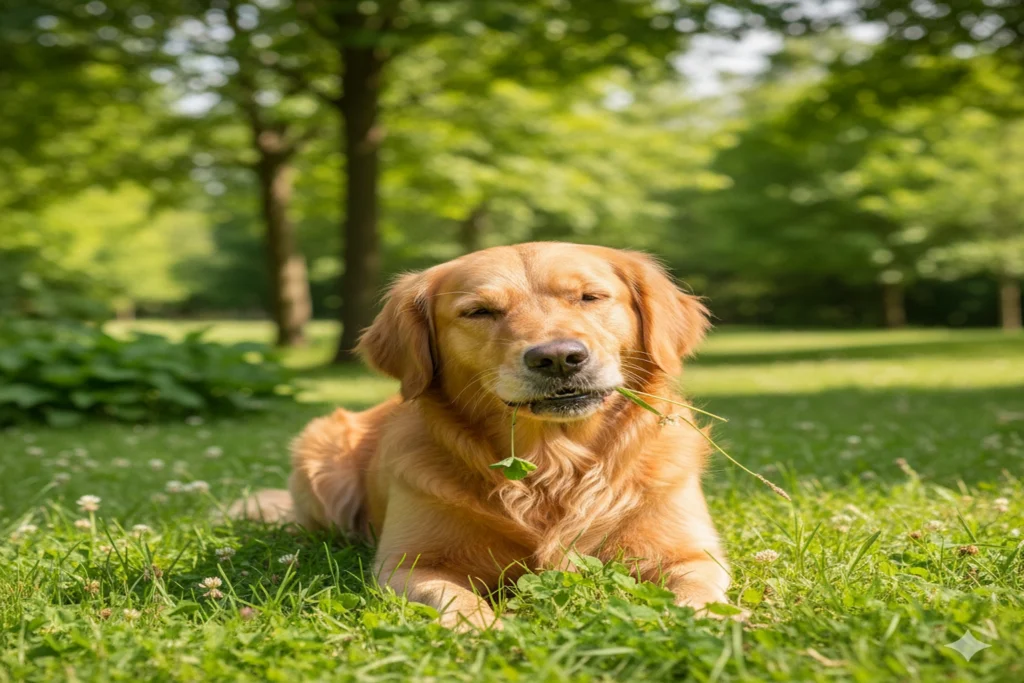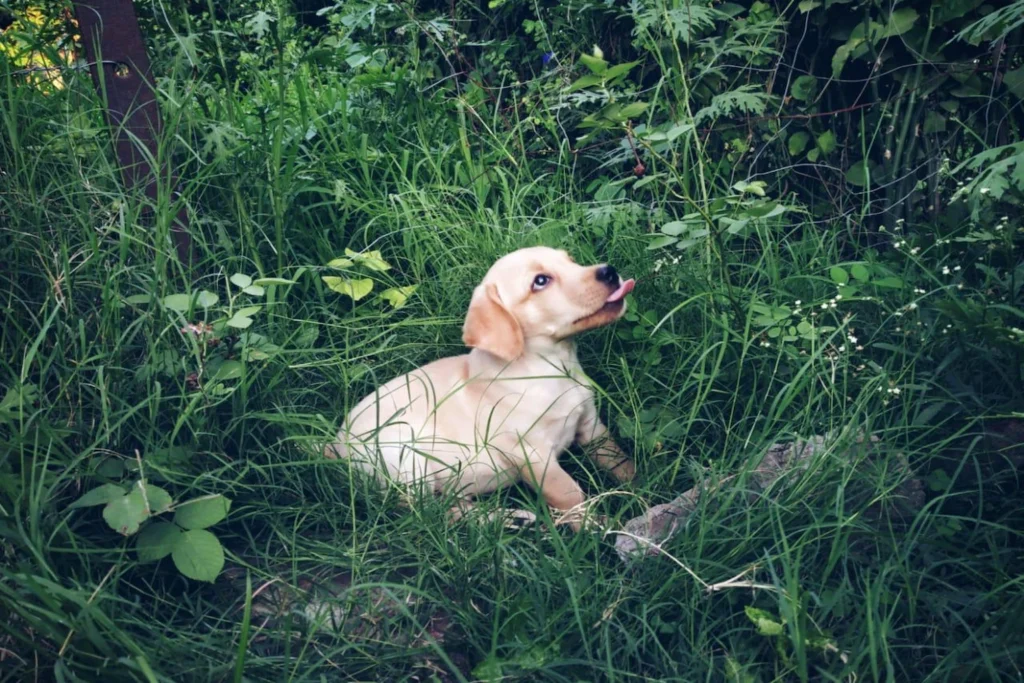You’re out walking with your dog and suddenly, they stop. Instead of sniffing around or chasing a squirrel, they begin munching on grass. As a pet parent, you might get panic and think; Is this normal? Or worse, is my dog sick?
Grass eating is one of the most common dog behaviors. Some dogs do it daily, others only once in a while. The reasons are not always the same, and often, it’s nothing to worry about. But there are times when grass eating can signal a problem. Let’s break down the real reasons behind this puzzling habit of why do dogs eat grass and when you should be concerned.
Is Grass Eating in Dogs Normal?
Many owners think eating grass means something is wrong. But in reality, this behavior is seen in healthy dogs too. Studies show that most dogs try grass at some point. But for many expert pet owners, it’s harmless and does not cause illness.
Occasional grass eating is part of normal dog behavior. The concern rises when it becomes frequent, compulsive, or paired with other symptoms like vomiting or diarrhea.
Why Do Dogs Eat Grass? The Common Theories
1. Instinct and Ancestral Behavior
As everyone is well aware, dogs are descendants of wolves. Wild canines often ate the stomach contents of herbivores, which includes grass as well. Some experts believe modern dogs eat grass because it’s instinctive.
2. Fiber and Digestive Aid
Grass is a natural source of fiber. Dogs may chew it to improve digestion or help food move smoothly through their system. Some vets even suggest it supports bowel movement.
3. Nausea Relief and Vomiting
You might notice your dog eat grass and then vomit shortly after. This has led to the theory that dogs eat grass when nauseous. However, evidence shows less than 25% of dogs vomit after eating it. So the link between grass and vomiting isn’t as clear as many think.
4. Nutrient Deficiency
Another theory states that dogs eat grass to fill a gap in their diet, especially fiber or certain micronutrients. If a dog’s food lacks something, grass might be their way of balancing it.
5. Boredom, Stress, or Pica
Grass eating is not always about health. Some dogs eat grass when they’re bored, anxious, or simply looking for stimulation. In rare cases, it could be linked to pica in dogs, a condition where pets eat non-food items.
6. Taste and Enjoyment
Some dogs just like the taste or texture of grass. Not every behavior has a medical explanation, sometimes it’s as simple as preference.
What Vets and Science Say
Veterinary experts often reassure owners that occasional grass eating is normal. But what if they eat it frequently? According to PetMD and VCA also, most dogs that eat grass show no signs of illness. Evidence does not strongly support the idea that grass is eaten only to vomit or cure nausea.
Still, vets also highlight a few risks:
- Lawns treated with pesticides or herbicides can be toxic for dogs.
- Soil can contain parasites that transfer to dogs.
- Excessive eating may point to an underlying GI disease.
The outcome is grass eating is often harmless, but context matters.
When to Worry About Grass Eating
Watch for these red flags to avoid further serious issues:
- Eating grass daily or compulsively.
- Vomiting frequently after eating grass.
- Signs of upset digestion: diarrhea, loss of appetite, bloating.
- Feeling lethargic or sudden changes in behavior.
- Grass eating paired with weight loss.
Excessive grass eating also signal gastrointestinal issues, parasites, or even inflammatory bowel disease (IBD). If you see these signs, it’s time to consult your vet.
Should You Let Your Dog Eat Grass?
In most cases, yes, there is no need to worry. Occasional grass nibbling is not dangerous. But safety comes first. Avoid letting your dog chew grass from treated lawns or areas sprayed with chemicals. So, always keep an eye on public parks too.
If your dog eats grass regularly, consider safe alternatives. Supervised grazing in a pesticide-free yard is usually fine.
What to Do if Your Dog Eats Grass
- Don’t panic – it’s often normal.
- Monitor patterns – note when and how often it happens.
- Improve diet – add more fiber if needed.
- Offer safe alternatives – dog-safe wheatgrass or indoor pots.
- Reduce boredom – make them busy with more walks, puzzle toys, and play.
- Check environment – ensure grass is free of toxins.
- See a vet – if behavior is frequent or comes with illness.
These small dog care tips can make a big difference in keeping your pup healthy and happy.
Healthy Alternatives to Grass
If you want to redirect the habit, here are safe options:
- Grow dog-safe grasses or wheatgrass indoors.
- Always add fiber-rich foods like canned pumpkin or psyllium husk.
- Include vet-approved probiotics for gut health.
- Offer crunchy, safe veggies like carrots or green beans.
This way, your dog still satisfies their chewing need while staying safe.
FAQs
Does dogs eating grass mean anything?
Not always. Many dogs eat grass for no serious reason. Sometimes it’s instinct, boredom, or simply taste. Other times, it could point to digestive needs or stress.
Do dogs eat grass when they’re sick?
Some do. Dogs with nausea may try grass as a way to vomit or settle their stomach. But not all grass eaters are sick. Watch for other symptoms before jumping to conclusions.
Should you let your dog eat grass if they want to?
Yes, if it’s occasional and from a safe area. Avoid treated lawns or chemically sprayed grass. If the behavior becomes frequent, check with your vet.
What to give my dog if he’s eating grass?
Try safe alternatives like wheatgrass or fiber supplements. Add natural options like pumpkin. Also focus on mental stimulation with toys and exercise. If grass eating is linked to nausea, your vet may suggest digestive support or medication.
Final Thoughts
Dogs eating grass is one of those behaviors that confuses many owners. In most cases, it’s nothing to stress about. Occasional grazing is a normal part of dog behavior. Still, if it’s excessive, or paired with vomiting and other health changes, it’s worth a vet visit. So, now you know why do dogs eat grass and vomit. With awareness, safe alternatives, and the right dog care tips, you can keep your pet happy, healthy, and worry-free.




